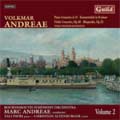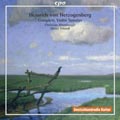Reflections
Christian Altenburger talked to Dr. Joachim Reiber, editor of the magazine „Musikfreunde“ from the Gesellschaft der Musikfreunde, Vienna.
Highly sought-after international soloist, chamber musician, Festival Director and teacher: these are quite a number of different rôles. Isn’t it hard to coordinate them all?
No, not really, because the balance is right and though the activities all have different facets, these complement each other very well, so that the different rôles have grown and developed out of each other. For instance, it was never my intention to become a Festival Director. Nevertheless, step-by-step, my love of chamber music has caused me to take on the artistic direction of two Festivals. The impulse here being the opportunity to share this love with friends. Not only did I want to make music with them, I felt the desire to devise projects myself and realise them with these friends.
In other words an unintended Directorship…
Yes, one could say so. At first, I planned and realised single chamber music projects with, for instance, the Gesellschaft der Musikfreunde in Vienna. The next step was an invitation to take over the artistic direction, together with the actress Julia Stemberger, of the Mondseetage Festival and to present chamber music and literature in a special Festival Programme. And once again, some years ago, came a request to take over the artistic direction of the “Schwäbische Frühling” Festival – a small but very ambitious Festival in southern Germany- whose architecturally attractive concert venues offer an ideal ambiance for chamber music.
Festivals of this sort have a particular attraction. Especially as regards chamber music, do you not enjoy certain definite advantages over normal concert series?
In certain ways, yes. Amongst normal concert series, it’s becoming more and more common for particular, but also sales reasons, to take famous names and briefly put them together into a chamber music formation. This can work wonderfully, but also go horribly wrong. When one plays oneself, and is, by way of many joint appearances, familiar and indeed friends with ones partners, then I think that one develops a different sense of who harmonises with whom and which casting would be the most appropriate for a particular piece.
Another advantage of Festivals of this kind lies certainly in the fact that one can develop a quite different programming than normal – if only for the reason that all the artists are on hand for a certain length of time. So, for instance, we were able recently, at the Mondseetage Festival, to connect in one programme Mozart’s Notturni for three voices and basset-horn, Schönberg’s string sextet “Verklärte Nacht” and a Literature Reading. And just such a combination, which for pragmatic reasons would not be possible in normal concert programming is, of course, very attractive. It has a different character and flavour when compared to a normal quartet evening – not that that is not a lovely thing too!
![]()
Apropos „Quartett“: As a passionate chamber musician yourself, are you not attracted to the idea of founding your own string quartet?
My solo appearances have and always will be very important to me! Therefore, such an idea remains an impossibility. Today, as a string quartet, playing in the “premier league” requires one hundred percent input from all the members. It really is either or – string quartet or solo career. So I have searched for my own particular route and found the solution to be the maintenance of a fixed circle of musicians with whom I play intensively, rather than one definite ensemble. I like to think that a quality has developed which differentiates us favourably from a group that has been randomly put together. I have played string trios with the cellist Patrick Demenga and the viola player Lars Anders Tomter for a long time. This is a formation amongst friends, which has grown to be a real ensemble.
In your opinion, how does playing solo relate to playing chamber music and what benefits does the one have for the other?
I find that primarily, solo playing benefits from the great deal learnt by playing chamber music. Let’s take for instance the Alban Berg Concerto: this should really be played as enlarged chamber music. One is lost if one doesn’t hear and doesn’t know what the other instruments are playing. The same is true of a Mozart Concerto, which is all about communicating in cooperation with the entire orchestra – again, one can’t simply play one’s part and hope the others will somehow follow. Chamber music hones the sensitivity towards this: music as give and take, as a coming together. That is the principle behind this form of music, which is also applicable to solo concerts. Unfortunately, the reality is often at cross-purposes. By allowing the soloist only minimal rehearsal time with the orchestra, musical understanding is necessarily reduced to the mere essentials and much that would be achievable in a chamber music format, is lost. The soloist can, however, work against this trend – especially if one is fortunate enough to be able to work closely with an excellent conductor.
Have you experienced this, have there been conductors who have been trusted “chamber music” partners?
Yes, certainly. James Levine, with whom I played a lot in my early years – solo, but indeed also chamber music, immediately comes to mind. Levine invested a lot of time. Prior to concerts with the Chicago Symphony Orchestra and the Vienna Philharmonic Orchestra he went as far as scheduling a rehearsal just for me alone. This was then followed by sufficient rehearsals with the orchestra, for instance when I played the Berg Concerto with him and the Vienna Philharmonic Orchestra in Salzburg. And then there was the time, as I have already mentioned, when I played chamber music with him every summer at the Ravinia Festival in Chicago, things such as the Brahms piano quartet. Levine even allowed me to play for him and seek his opinion on projects where no collaboration was planned between us. That was very rare and fortunate. He influenced me very positively and I learnt a lot from him.
Which of his insights have proved particularly valuable to you?
The most important is the sense of appropriate tempo for the individual concert venue and audience. As I continue to ascertain today in my own teaching, this is a most decisive aspect. Because it is not sufficient simply to have a sense of the piece. One also has to know: how does one transmit or project the piece? How loud must I play in order that the audience really appreciates a crescendo? How great should I make the difference between Pianissimo and Fortissimo? Young musicians usually tend to play too fast and don’t take enough time to plumb the dynamic depths.
![]()
There is hardly a famous name of the last decades missing amongst the list of Conductors with whom you have played solo: Claudio Abbado, Herbert Blomstedt, Christoph von Dohnányi, Bernard Haitink are there, Lorin Maazel, Zubin Mehta und Václav Neumann, Roger Norrington, André Previn, Wolfgang Sawallisch, Franz Welser-Möst … Who of these has been particularly important to you?
It is very difficult, if not impossible to make such an evaluation. But I should mention who most particularly influenced my musical career and that has been, aside from James Levine, Zubin Mehta. Thanks to him, I found the courage at 16 to go to America and study under Dorothy DeLay at the Juilliard School. A decisive and happy choice for my artistic and personal development.
How did you meet Zubin Mehta?
At 15, I substituted at the Vienna Philharmonic Orchestra and Mehta, who was always interested in the up and coming musicians, wanted to know who I was and invited me to play for him. On his advice, I left Vienna, though not without completing my diploma at the Vienna University of Music. Four years later in 1978, I completed my diploma at Juilliard. The following year I shuttled between the New and Old worlds in order to round off my musical education, although by this time I was already enjoying my first international appearances.
Dorothy DeLay’s class, as recommended by Zubin Mehta, turned out to have a decisive influence on you…
Yes definitely. Dorothy Delay was in all respects a stroke of luck. She exuded great warmth and was approachable regarding all manner of things, not just playing the violin. This was very important for me, who at 16 was taking such a big step. In a word: a great teacher with wide-reaching knowledge and a wide horizon.
Nevertheless, one could pointedly ask: what did New York have to offer that you couldn’t have learnt here in the city of music Vienna?
Of course I enjoyed an excellent training in Vienna, at first with my father, who himself was a violinist and member of the Vienna Philharmonic Orchestra, later with Ernst Morawec a legendary figure in the Viennese music scene, principal viola player of the Vienna Philharmonic Orchestra and member of the Schneiderhan Quartet. But it was very important for my personal development to leave this sheltered environment and, with hindsight, this move to New York at such a young age proved to be of great value in my quest for independence. In addition, several of the world’s best young violinists were assembled in Dorothy DeLay’s class: Shlomo Mintz was in my class, Mark Kaplan was studying there, also Nadia Sonnenberg and Nigel Kennedy, with whom I shared an apartment for some time. In other words, there was some healthy competition at this school, something, which undoubtedly spurred us all on and from which I profited enormously.
![]()
Today, you hold a professorship yourself at the Vienna University of Music and Performing Arts and prior to this, held a professorship for many years at the Hannover University of Music. Are there principles in your teaching, which you took from Dorothy Delay and continue in your own way?
Three points come to mind: The first is that Dorothy Delay always strived to put her students at ease. Fear and pressure are not conducive to study. This is also my conviction. Additionally, one should always treat one’s students with respect. The second important point is that in order to really help a student, one has to know precisely how things work and I’m talking here about the technical/practical nitty-gritty: what exactly do I need to do in order to improve this or the other? What happens when I don’t do it? And I’m not referring to endless monologues or instructions along the lines of “this is simply how it’s done” but to the ability to articulate a correction precisely and succinctly. In this area of analysis, I have also learnt a lot from Dorothy DeLay. The third point regards motivation and initiating responsibility in the student. This concerns many things, from the student who studies violin but doesn’t practise enough – this is where one must be sensitive and not apply pressure – to encouraging a student to seek his own individual interpretation of a piece. The goal must be that the student can interpret the pieces he has studied with conviction.
How was your motivation at the very beginning of your career? Were there certain expectations in the “Philharmonic” Altenburger household?
No, not at all. Thankfully, my father had no particular ambition that I take up the violin. But I wanted to and repeatedly asked to be allowed to. So I was given a toy violin, which made the most appalling sounds – I think my father suffered as well – so then I was given my first proper violin and my father taught me, but just for fun and with no pressure. I didn’t practice for particularly long as a child and was certainly no child prodigy. The most important thing remains, in such cases, to grow up with the instrument.
Later you studied at the Vienna University of Music.
Yes, at that time it was still possible, outside of normal school, to attend the University as an external student. I majored in Composition …
What has become of the composer Christian Altenburger?
Nothing! The first four years of the course were concerned with musical theory and analysis; the actual composition class would have then started. Nevertheless, for a violinist, I certainly studied theory very intensively.
![]()
So a composer did not emerge from the composition class – however an interpreter with a special relationship to contemporary music. Because composers belong to your inner circle of friends and have always been an important part of your life and artistic work…
Contemporary music is an important component of my work. In my opinion, every performing artist should, as a matter of course, be concerned with what is being created in the here and now. And as regards myself, I’m not talking merely about a “duty”. The opportunity to be present during the creation of a work is an incredibly exciting experience and it’s just as enriching to exchange views with the composer about an existing work or receive immediate feedback from him after a performance or rehearsal. I experienced all of this intensely in my collaboration with Gerhard Schedl. Working with Kurt Schwertsik, Helmut Schmidinger, Gottfried von Einem, Bert Breit, Werner Pirchner, Thomas Larcher, Erich Urbanner, Theodor Berger, Wilhelm Killmayer and Witold Lutoslawski also confirmed beautifully just how valuable the personal meeting between interpreter and composer can be.
How important are contemporary works to Concert Programmes today? Which pieces can be played within the context of the “classical” repertoire?
Naturally, we are living in a time where, particularly in music, (otherwise in Art and Literature) the interest of the broad audience is, to a large extent, drawn to the works of the past – musicians are repeatedly confronted with this fact. On the other hand, I have often found, that when contemporary music is played well, the audience can be just as enthusiastic as when established repertoire pieces are played. The consequences are obvious: in my opinion, it is essential to devote just as much attention to the performance of a contemporary work as one would to a work by Mozart Beethoven or Brahms. When we, the musicians, also give of our best here, contemporary masterpieces are sure to find there place in “classical” concert programmes.
The interviewer was Dr. Joachim Reiber.
Abgelegt unter:




 Christian Altenburger was awarded the honorary prize 2018 for outstanding performance in music by the country of Lower Austria
Christian Altenburger was awarded the honorary prize 2018 for outstanding performance in music by the country of Lower Austria Volkmar Andreae's Violin Concerto and Rhapsody released for the first time on CD.
Volkmar Andreae's Violin Concerto and Rhapsody released for the first time on CD. Complete Heinrich von Herzogenberg sonatas available now on CD. Violin/viola Christian Altenburger. Piano Oliver Triendl.
Complete Heinrich von Herzogenberg sonatas available now on CD. Violin/viola Christian Altenburger. Piano Oliver Triendl.